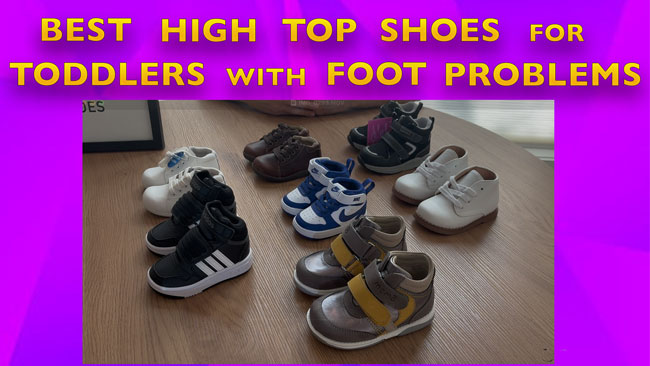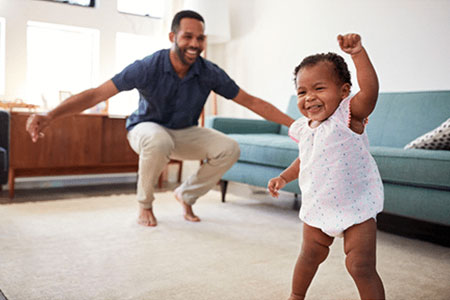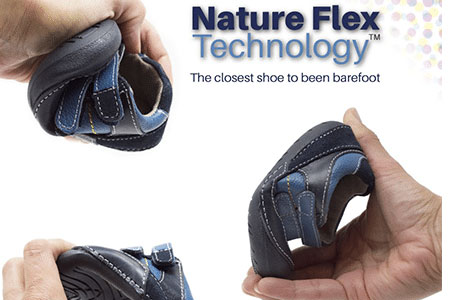At What Age Do Children Start Walking? – Is it Time to Worry?
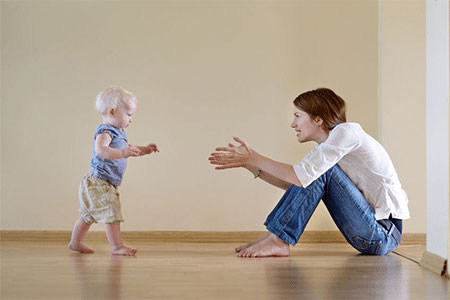
As a dedicated shoe fitter specializing in children’s footwear, I often encounter concerned parents eager to understand more about their child’s walking development. One of the most common questions is: “At what age do children start walking?” Understanding walking milestones is essential for parents, as it helps them determine if their child is developing typically and when to seek further guidance. Most babies take their first steps by around 14 months, but if your little one takes a bit longer, there’s no need to worry. It’s perfectly normal—I’ve worked with many babies who didn’t start walking until 16 or even 17 months. Every child moves at their own pace!
Is Your Baby Holding Onto Furniture and Moving Side-to-Side?
Even if your baby is not walking yet, you may notice that your baby can perform other motor skills with no problem, like standing alone, pulling up on furniture, and bouncing up and down. Some babies are just late walkers. There can be several reasons why it’s taking longer for your baby to learn how to walk, many of which aren’t serious but more related to your baby’s personality.
Most babies take their first steps by around 14 months, but if your little one takes a bit longer, there’s no need to worry. It’s perfectly normal—I’ve worked with many babies who didn’t start walking until 16 or even 17 months. Every child moves at their own pace!
Let’s start by looking at the typical stages babies go through as they learn to walk. I’ve put together a general timeline based on my experience observing hundreds of babies at the specialized children’s shoe store where I work. Keep in mind—every child is different, and these time frames are just estimates.
12 Months – The Cruising Stage
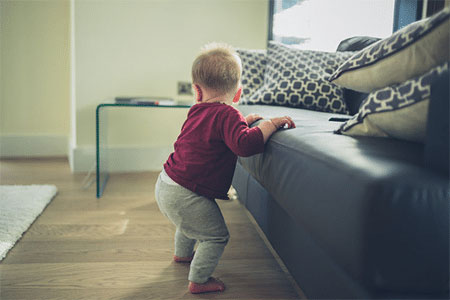
Some babies might be already walking by 12 months, but keep in mind that most of them are probably doing it unsteadily. If your babies are still in the cruising stage, it simply means that walking on their own is going to take them a little longer.
14 to 15 Months – Standing Alone
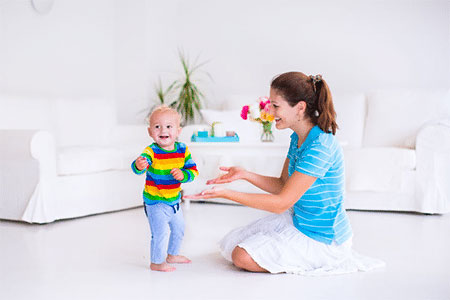
A baby being unable to walk at 14 months isn’t usually indicative of a problem. As long as you notice that your baby can perform other motor skills with no problem, such as standing alone, pulling up on furniture, and bouncing up and down, then these are all signs that your baby’s motor skills are developing.
18 Months – Proficient Walkers

There is no correlation between how soon your babies walk and how smart they are. The age of babies’ walking is as variable as their personalities.
Is Your Baby Ready to Wear Shoes?
Shoes come into play when you take your baby to play outside, as it’s important to allow them to go barefoot around the house for healthy foot development. Going barefoot improves balance and coordination.
Best Shoes for Babies Learning How to Walk in 2025
Barefoot walking indoors allows children to strengthen their foot muscles and improve sensory feedback, which is critical for balance. As they transition to outdoor environments, the type of shoe becomes vital. Shoes with proper grip, support, and comfort play a significant role in enhancing their walking experience. Disclosure: This post contains affiliate links, and we may earn a small commission at no extra cost to you.
1. Shoe Style Stevie II by See Kai Run. These See Kai Run soft sole baby shoes for walking are a popular choice among parents for their wide toe boxes and adjustable straps.
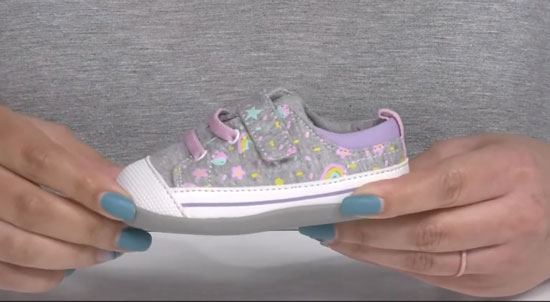
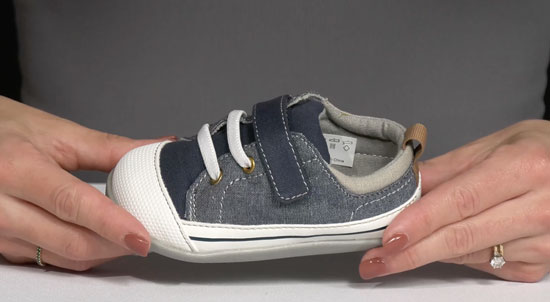
Key Features
- Order the shoe Stevie II by See Kai Run on Amazon or Zappos
- Not available in wide or extra wide widths but fits naturally wide
- Awarded the Seal of Acceptance from the American Podiatric Medical Association (APMA)
- Durable cotton drill upper, comfy leather insole, and recycled mesh lining keep feet fresh
- Breathable textile lining and cushioned insole
- I suggest that you get this shoe a whole size larger than your toddler’s current foot size
2. Shoe Style Thompson by Stride Rite. These baby first walking shoes feature a flexible sole and a rounded toe design to support natural movement, making them a favorite among parents and podiatrists alike.
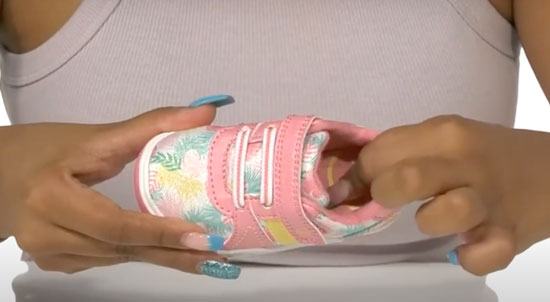
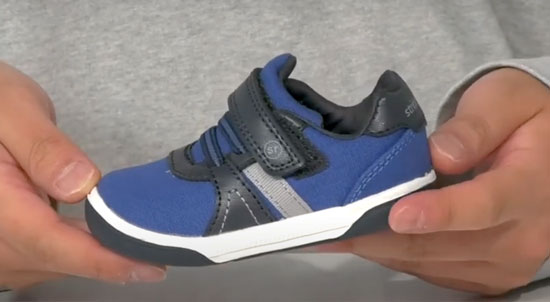
Key Features
- Order the shoe Thompson Sneaker on Amazon
- Available in wide widths
- Awarded the Seal of Acceptance from the American Podiatric Medical Association (APMA)
- Padded tongue and collar for added comfort
- Breathable textile lining and cushioned insole
- I suggest that you get this shoe a whole size larger than your toddler’s current foot size
3. Shoe Style Artie and Adalyn by Stride Rite. These Stride Rite baby walking shoes provide excellent width options (wide and extra wide) and a comfortable fit. Their design includes flexible outsoles and cushioned insoles, which are essential for active babies.
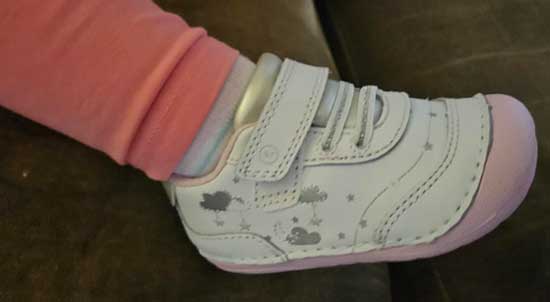
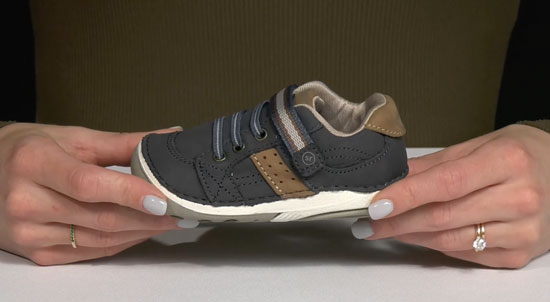
Key Features
- Order the shoe Artie and Adalyn by Stride Rite on Amazon or Zappos
- Rounded edges to decrease stumbles and falls
- Available in wide and extra wide widths
- I suggest that you get this shoe a whole size larger than your child’s current foot size
4. Shoe style Archie and Kiki by Stride Rite. These baby soft sole sandals are made of breathable materials, provide a secure fit, and have the flexibility needed for a growing child.
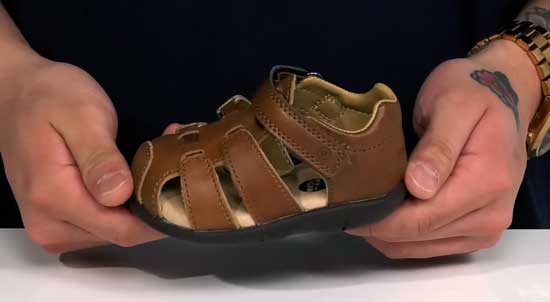
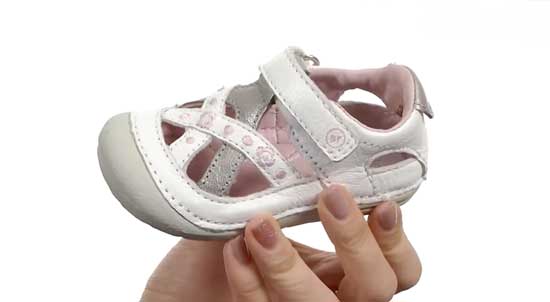
Key Features
- Order the shoe Archie and Kiki on Amazon or Zappos
- Available in wide and extra wide widths
- Leather upper
- Foam padding placed around the ankle collar and under the tongue for a comfortable fit
- I suggest that you get this shoe a half size larger than your toddler’s current foot size
5. Shoe Style Martin by Stride Rite. These Stride Rite baby booties feature double Velcro straps for easy on and off and plush cushioning, making them perfect for everyday wear.
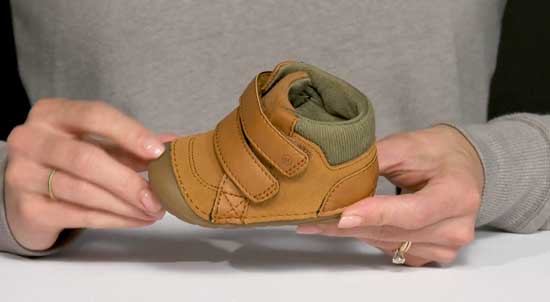
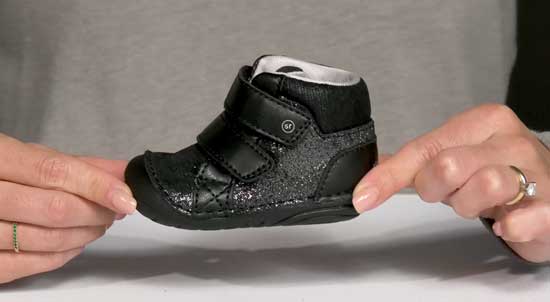
Key Features
- Order the shoe Martin by Stride Rite on Zappos
- Available in wide and extra wide widths
- I suggest that you get this shoe a whole size larger than your toddler’s current foot size
6. Shoe style Gaia by Stride Rite. These Stride Rite soft sole shoes feature double Velcro straps for a secure fit and fuss-free wear.
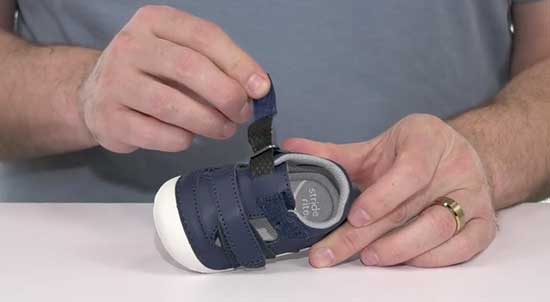
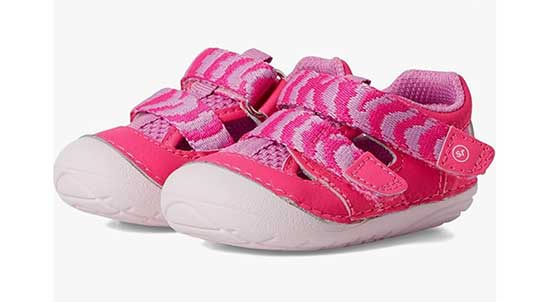
Key Features
- Order the shoe Gaia by Stride Rite on Zappos or Amazon
- Available in medium and wide widths (fits high insteps)
- APMA approved
- Round-toe design
- I suggest that you get this shoe a whole size larger than your baby’s current foot size
Get in Touch for a Personalized Suggestion
Every child’s foot is unique, and personalized shoe recommendations can make a world of difference. As a shoe fitter, I offer tailored suggestions based on your baby’s walking state and foot shape or condition. Don’t hesitate to reach out for professional guidance to ensure your baby’s feet are well-supported.
Can You Help Your Baby Walk?
Several parents have asked me if there is something they can do to help their babies walk. There is nothing you can really do to speed up the learning process, but do make sure that you provide your baby with the correct pair of first walking shoes, as they play a key role in providing confidence and balance for your baby.
Worried Your Baby Isn’t Walking Yet?
If your baby hasn’t started walking by 18 months, it’s completely normal to feel concerned. If you’re feeling unsure, it’s always a good idea to check in with your pediatrician to rule out possible issues like low muscle tone or developmental delays. A little peace of mind can go a long way.
Has Your Baby Been Diagnosed with Low Muscle Tone?
While there could be several reasons why your baby is unable to walk, the one I am most familiar with is having a condition called hypotonia or low muscle tone. If your baby has been diagnosed with low muscle tone there are certain steps that you can take to improve posture and coordination, as well as strengthen the muscles around the joints of the legs so they provide more support and stability.
A baby might be diagnosed with low muscle tone for the following reasons:
- Your baby’s muscles appear to be less firm than usual.
- Your baby appears to be floppy and to have loose joints.
- Your baby appears to be less alert and has poor posture.
In this case, you will need to provide a pair of shoes to support your baby’s feet (in particular their ankles), to help them stabilize themselves.
Best Shoes for Babies with Low Muscle Tone for Better Balance
These shoes can help improve posture and coordination, as well as strengthen the muscles around the joints of the legs so they provide more support and stability.
1. Shoe Style 990v6 by New Balance. This is the absolute best shoe if your baby has low muscle tone. The robust outsole helps distribute weight evenly across the foot and reduces strain on the muscles and joints. The downside that many parents complain about is the high price tag.
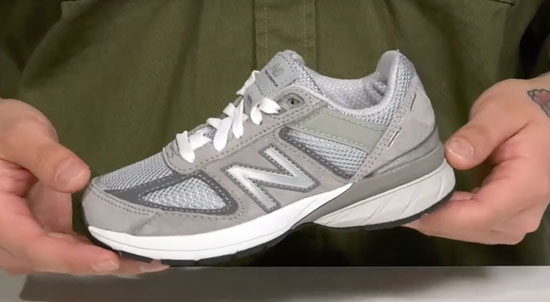
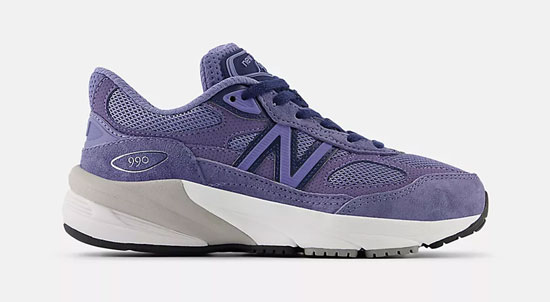
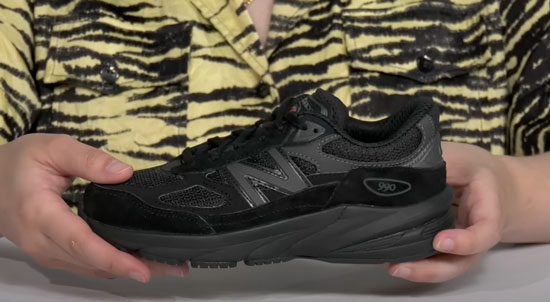
Key Features
- You can order the 990v6 with laces on the New Balance website, Amazon, or Zappos
- Available in medium, wide, and extra wide widths
- Also available in pink and navy blue
- There is also a Velcro version of these shoes available in navy blue and pink
- I suggest getting this shoe a half size larger than your toddler’s current foot size
2. Shoe Style Gabi by Memo (Orthopedic Shoe). These orthopedic shoes are ideal for babies with low muscle tone as they are specifically designed to improve foot posture and comfort.
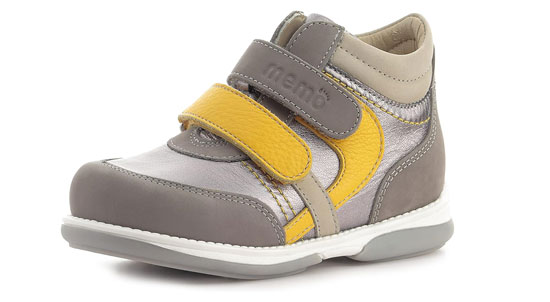
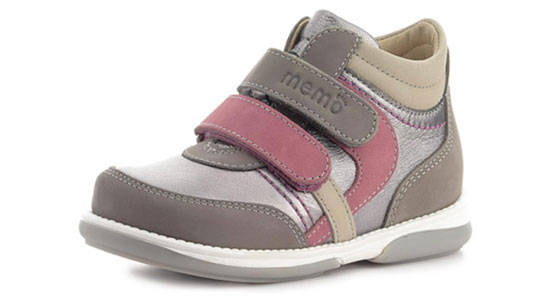
Key Features
- You can order the shoe style Gabi by Memo on Amazon
- Fits medium and wide feet
- Also available in a Mary Jane style
- I suggest getting this shoe a half size larger than your toddler’s current foot size
3. Shoe Style Elliott by Stride Rite. These high-top booties by Stride Rite offer excellent support and a comfortable fit, making them a top choice for babies with low muscle tone.
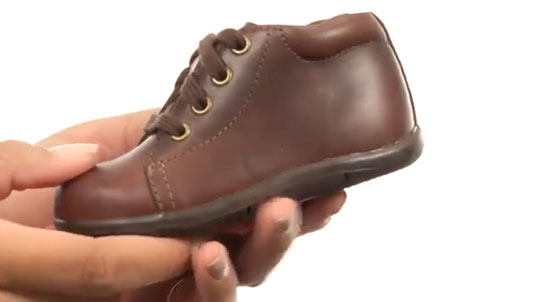
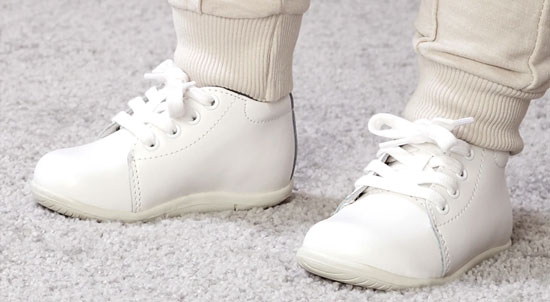
Key Features
- You can order the shoe style SRT Elliot by Stride Rite on Amazon or Zappos
- Available in medium, wide, and extra wide widths
- I suggest getting this shoe a whole size larger than your toddler’s current foot size
4. Shoe Style 2002 by New Balance. The 2002 model by New Balance is another great option for babies with low muscle tone at a more affordable price point than the 990v6.
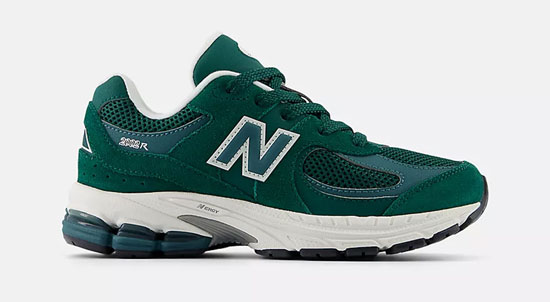
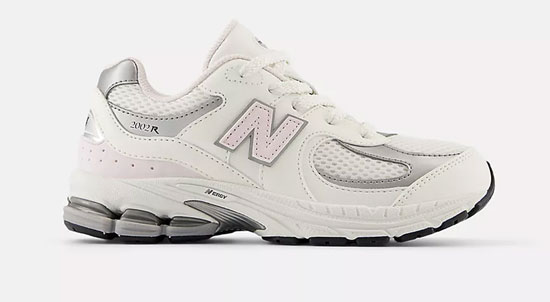
Key Features
- Order the shoe 2002 by New Balance on the New Balance website
- Available in medium and wide widths
- I suggest getting this shoe a whole size larger than your toddler’s current foot size
Understanding walking milestones and the importance of supportive footwear can empower you to make informed decisions about your child’s development. Remember, every child is unique, and while some may take longer to walk, they will get there in their own time. If you’re ever uncertain or concerned, don’t hesitate to seek professional advice.

